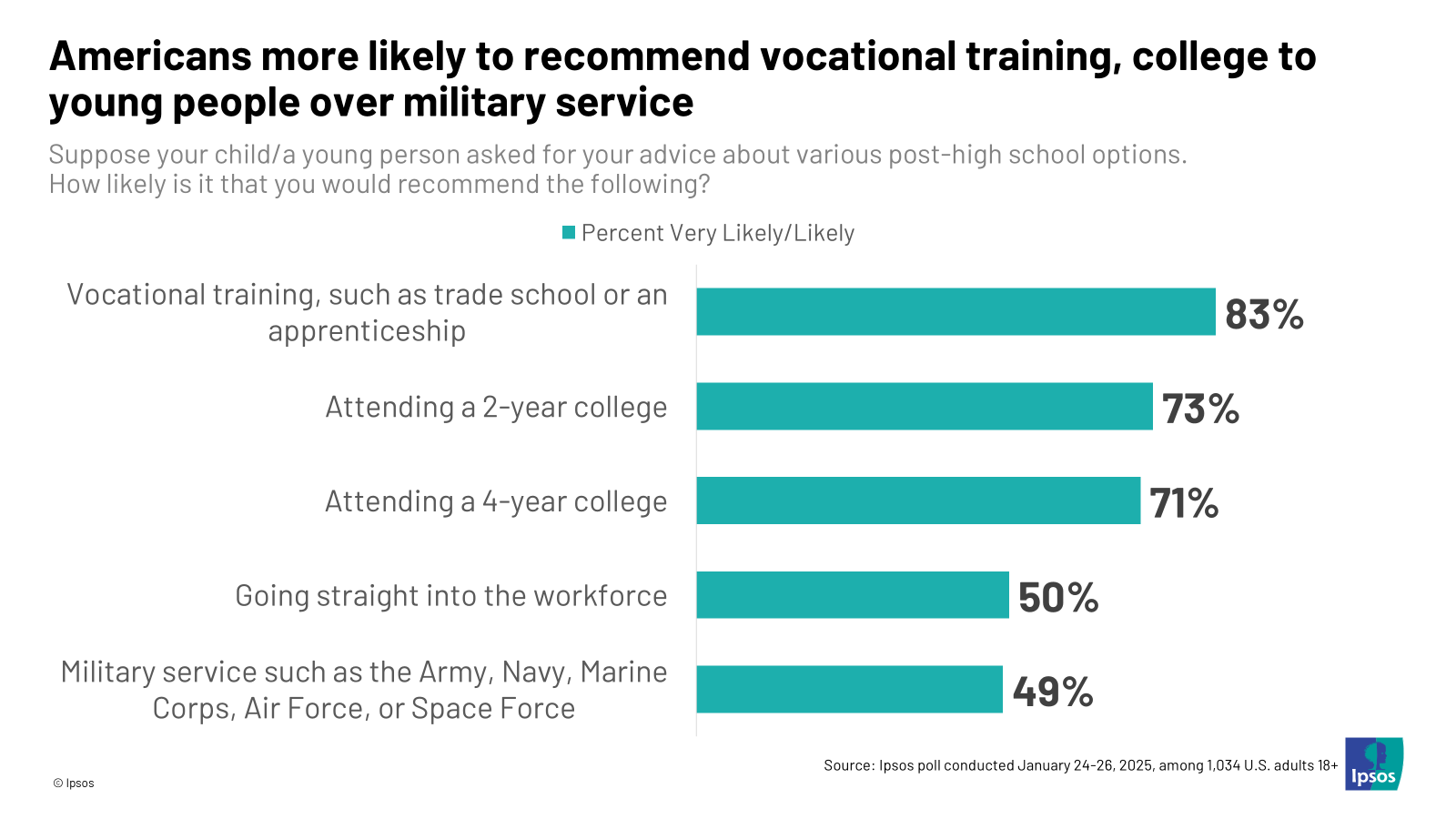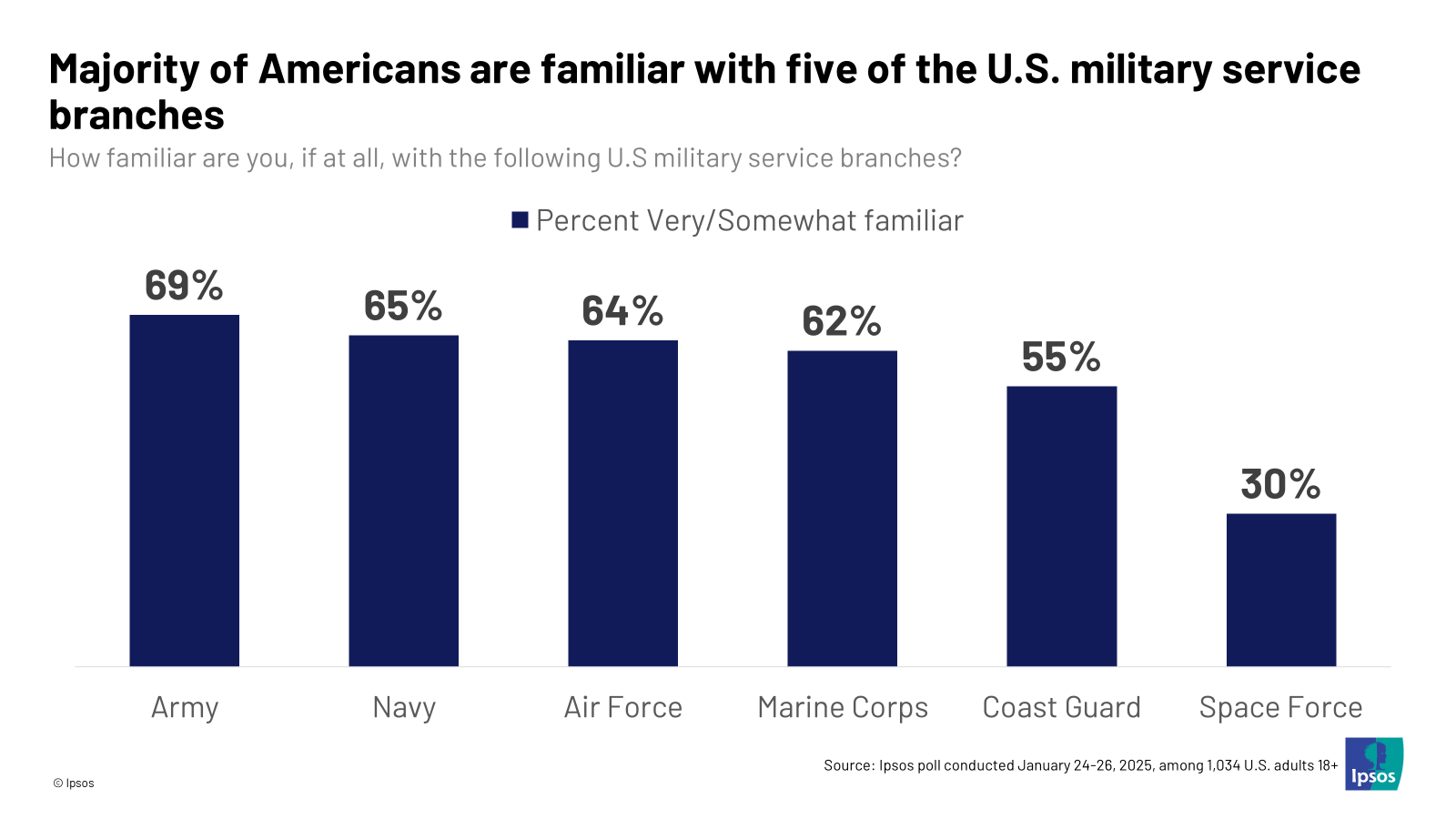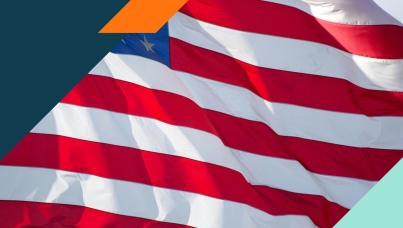Half of Americans would recommend military service to young people they know
Washington DC, February 11, 2025—Ipsos polling finds that most Americans would be likely to recommend vocational training after high school to their child or a young person in their life but are less likely to recommend military service or going to straight into the workforce. At the same, most Americans are familiar with the U.S. military service branches, though few are familiar with the U.S. Space Force.
Detailed findings:
Most Americans would be likely to recommend vocational training or a college program to their child or a young person in their life post-high school. Though, fewer would recommend going straight into the workforce or going into military service.
- Nearly all (83%) say they would be likely to recommend vocational training, such as trade school or an apprenticeship, after high school to their child or a young person they know, regardless of party.
- Three in four would recommend attending a 2-year college (73%) or 4-year college (71%) after high school to young people in their life.
- Americans are mixed about recommending the military service to the young people in their life after high school (49% likely vs. 49% not likely). Likewise, the public is split on recommending going straight into workforce after high school to their child or a young person they know (50% likely vs. 46% not likely).

Most Americans are familiar with most of the U.S. military service branches tested.
- A majority of Americans say they are familiar with the Army (69%), Navy (65%), Air Force (64%), Marine Corps (62%), and the Coast Guard (55%).
- However, only 30% are familiar with the United States Space Force.
- About one in ten (11%) say they an immediate family member serving on active duty in the U.S. Armed Forces, Military Reserves, or National Guard.

About the Study
This Ipsos poll was conducted from January 24 to January 26, 2025, using the probability-based KnowledgePanel®. This poll is based on a nationally representative probability sample of 1,034 adults age 18 or older.
The survey was conducted using KnowledgePanel, the largest and most well-established online probability-based panel that is representative of the adult U.S. population. Our recruitment process employs a scientifically developed addressed-based sampling methodology using the latest Delivery Sequence File of the USPS – a database with full coverage of all delivery points in the U.S. Households invited to join the panel are randomly selected from all available households in the U.S. Persons in the sampled households are invited to join and participate in the panel. Those selected who do not already have internet access are provided a tablet and internet connection at no cost to the panel member. Those who join the panel and who are selected to participate in a survey are sent a unique password-protected log-in used to complete surveys online. As a result of our recruitment and sampling methodologies, samples from KnowledgePanel cover all households regardless of their phone or internet status and findings can be reported with a margin of sampling error and projected to the general population.
The study was conducted in English. The data for the total sample were weighted to adjust for gender by age, race/ethnicity, education, Census region, metropolitan status, and household income. The demographic benchmarks came from the 2024 March Supplement of the Current Population Survey (CPS). The 2024 presidential vote choice benchmarks came from the Federal Elections Commission 2024 election results for the U.S. President.
- Gender (Male, Female) by Age (18–29, 30–44, 45-59 and 60+)
- Race/Hispanic Ethnicity (White Non-Hispanic, Black Non-Hispanic, Other, Non-Hispanic, Hispanic, 2+ Races, Non-Hispanic)
- Education (Less than High School, High School, Some College, Bachelor’s degree, Master’s degree or higher)
- Census Region (Northeast, Midwest, South, West)
- Metropolitan status (Metro, non-Metro)
- Household Income (Under $25,000, $25,000-$49,999, $50,000-$74,999, $75,000-$99,999, $100,000-$149,999, $150,000+)
- 2024 Presidential Election Vote (Donald Trump, Kamala Harris, Other, Did not vote)
The margin of sampling error is plus or minus 3.9 percentage points at the 95% confidence level, for results based on the entire sample of adults. The margin of sampling error takes into account the design effect, which was 1.65.
The margin of sampling error is higher and varies for results based on sub-samples. In our reporting of the findings, percentage points are rounded off to the nearest whole number. As a result, percentages in a given table column may total slightly higher or lower than 100%. In questions that permit multiple responses, columns may total substantially more than 100%, depending on the number of different responses offered by each respondent.
For more information on this news release, please contact:
Chris Jackson
Senior Vice President, US
Public Affairs
+1 202 420-2025
[email protected]
Mallory Newall
Vice President, US
Public Affairs
+1 202 374-2613
[email protected]
About Ipsos
Ipsos is one of the largest market research and polling companies globally, operating in 90 markets and employing over 18,000 people.
Our passionately curious research professionals, analysts and scientists have built unique multi-specialist capabilities that provide true understanding and powerful insights into the actions, opinions and motivations of citizens, consumers, patients, customers or employees. Our 75 solutions are based on primary data from our surveys, social media monitoring, and qualitative or observational techniques.
Our tagline "Game Changers" sums up our ambition to help our 5,000 customers move confidently through a rapidly changing world.
Founded in France in 1975, Ipsos has been listed on the Euronext Paris since July 1, 1999. The company is part of the SBF 120 and Mid-60 indices and is eligible for the Deferred Settlement Service (SRD). ISIN code FR0000073298, Reuters ISOS.PA, Bloomberg IPS:FP www.ipsos.com



